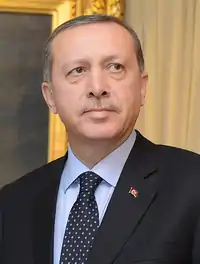The world is bigger than five
The world is bigger than five (Turkish: Dünya beşten büyüktür) is a politic doctrine expressed by current president of Turkey, Recep Tayyip Erdoğan. The "five" in the sentence refers to the five countries which are permanent members of the United Nations Security Council. These five countries' veto right is the doctrine's main objection. Tayyip Erdoğan, argues that these five countries are deactivating United Nations,[1] and mentioned the UNSC's failure on creating solutions and making peace on Palestine, Syria and other places.[2] Erdoğan, uttered the doctrine first time in 2013,[2][3] and mentioned that in his speech on 74th United Nations General Assembly, New York.[4] The doctrine enters down to textbooks.[5]

A rapper nicknamed as Ek'rem published "The World is Bigger Than Five" song in 2017.[6]
Analysis
Some scholars noted that the Erdogan's approach is also related to the unfairness between nuclear-armed states and the non-nuclear armed states,[7] and the criticism of EU and NATO.[8]
References
- "Erdoğan: Dünya 5'ten büyüktür". Al-Jazeera.com. Archived from the original on 2020-11-13.
- ARAL, BERDAL (2019). ""The World Is Bigger than Five": A Salutary Manifesto of Turkey's New International Outlook". Insight Turkey. 21 (4): 71–96. doi:10.2307/26842779. ISSN 1302-177X. JSTOR 26842779.
- "Dünya 5'ten büyüktür kampanya oldu". hurriyet.com. Archived from the original on 2020-11-13.
- "Erdoğan bir kez daha söyledi". ahaber.com. Archived from the original on 2019-11-22.
- "Dünya 5'ten büyüktür ders kitabına girdi". birgun.net. Archived from the original on 2020-11-18.
- "Dünya 5'ten büyüktür şarkı oldu". aa.com. Archived from the original on 2020-11-13.
- Lindenstrauss, Gallia (2019). "Erdogan's Threat on Nuclear Militarization". Institute for National Security Studies. JSTOR resrep19456. Cite journal requires
|journal=(help) - Lindgaard, Jakob; Pieper, Moritz. "TURKEY'S NATO FUTURE: Between alliance dependency, Russia, and strategic autonomy". Danish Institute for International Studies. doi:10.2307/resrep25197.6. JSTOR resrep25197.6. Cite journal requires
|journal=(help)
